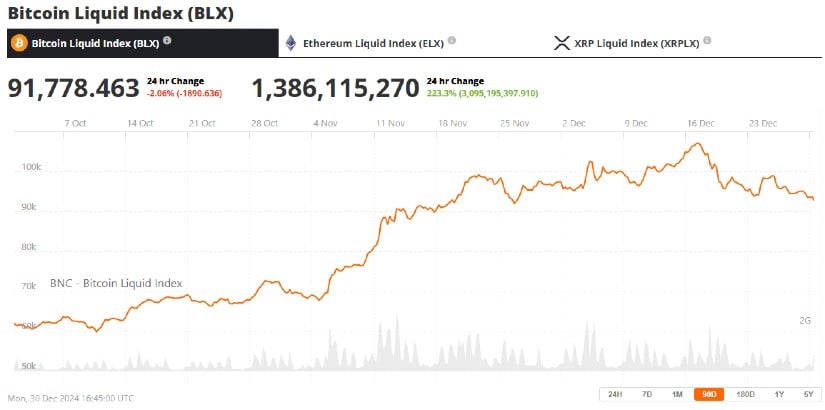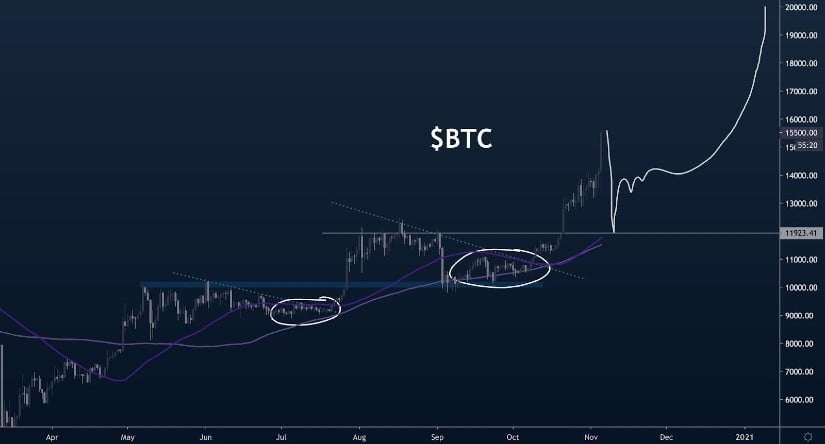Is the Bitcoin bull market over? Or ready to roar once again?
Bitcoin, the world’s largest cryptocurrency, has faced a significant price correction, dropping to $94,830—down over 12% from its monthly peak.
According to CoinGecko, the decline comes as trading activity slows during the holiday season, with daily trading volumes falling to $22 billion on December 29 from $41 billion the previous day. Normally, Bitcoin experiences volumes exceeding $100 billion, but investor caution and reduced participation during the festive period have dampened momentum.
Market Factors Weighing on Bitcoin
The price drop has been attributed to multiple factors, including macroeconomic shifts and investor sentiment. The Federal Reserve’s recent monetary policy decision has been a key influence. Earlier in December, the Fed lowered the interest rate by 0.25%, implying an easing cycle less aggressive than many forecasts, hinting at two instead of four cuts in 2025. A more hawkish outlook has kept investors cautious on risk assets such as cryptocurrencies, as traders continue repositioning themselves amid soft and gradual monetary loosening.

Bitcoin (BTC) price chart. Source: Bitcoin Liquid Index (BLX) via Brave New Coin
Besides, Bitcoin has been plagued by waning institutional interest through exchange-traded funds (ETFs). While accumulation from the Bitcoin ETFs amounts to $35.6 billion in 2024, inflows have decelerated. This means that institutional investors are wary to take a further bet on a market that seems blurry. In the same manner, doubts over the creation of the much-vaunted Strategic Bitcoin Reserve have further weakened the bullish sentiment.
The Absence of a Santa Claus Rally
Historically, December is a very strong month for Bitcoin, as it is normally witness to what was once termed the “Santa Claus rally,” or a rise in asset prices during the holiday period. This year, though, that rally never showed up, disappointing investors. Now, market participants are pinning their hopes on what is called the “January effect,” a phenomenon that often sees financial assets rally in the first month of the year as investors adjust their portfolios.
Whereas the January effect has been a stalwart for some asset classes through the years, Bitcoin’s history is mixed in the first month of the year. In the last ten Januarys, six were up, including a gain of 0.62% last year. However, February has proven to be traditionally a much better month with fewer instances of negative performance for Bitcoin.
Technical Analysis Points to Key Levels
On the technical front, Bitcoin is resting around a key support near its 50-day simple moving average, a level that has, for the most part, represented a critical pivot for price action in the cryptocurrency. Further, Bitcoin’s price stays above an ascending trendline drawn from the middle of November, indicating that it could retain some resilience despite the recent weakness.

Source: X
This bearish technical signal paints a rising broadening wedge pattern, making it precarious for further downside. Should Bitcoin pierce through the low of the pattern, the cryptocurrency would likely slide toward support at $73,777, which was last touched in March. If the cryptocurrency instead bounces from here, it may go up to the $110,000 level, retesting the upper boundary of the wedge.
Outlook for 2025
As the year draws to a close, Bitcoin’s short-term trajectory will largely depend on macroeconomic developments, investor sentiment, and institutional inflows. Regulatory changes, particularly in Europe with the rollout of the Markets in Crypto-Assets (MiCA) framework, may also play a pivotal role in shaping market dynamics.
The interplay between these factors will determine whether Bitcoin can regain upward momentum in early 2025 or face continued consolidation. With investors keeping a close eye on the January effect, the coming weeks could set the tone for Bitcoin’s performance in the new year. What’s your Bitcoin price prediction for 2025? We’ll soon find out.




